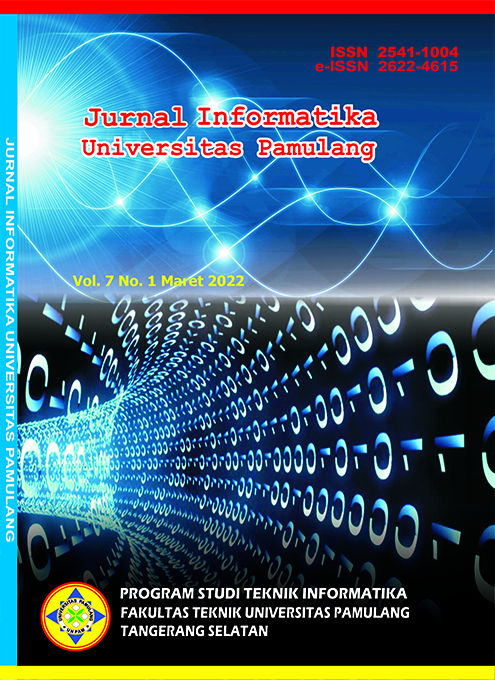Pengujian Website Infotech Menggunakan Teknik Black-Box Decision Table
DOI:
https://doi.org/10.32493/informatika.v7i1.17315Keywords:
Black Box Testing, Decision Table, Website, InfotechAbstract
Infotech is a website-based information system that displays information about practicums, workshops, and information related to the informatics laboratory of the University of Muhammadiyah Malang. Some users complain of system errors such as website server down, login problems, and system bugs. The purpose of this research is to test the quality of the infotech website by using the black-box testing technique of the decision table method. This method focuses on functional testing of software. The main features will be tested, namely the login feature, and the file submit feature. Decision table is a black-box testing technique that contains system test cases in tabular form. Based on the research conducted, the final results show that the two main features tested display output in accordance with predetermined rules or conditions without experiencing system bugs, so it can be concluded that the quality of the infotech website, especially the login and file submission features, is good.
References
Ardana, I. M. S. (2019). Pengujian Software Menggunakan Metode Boundary Value Analysis dan Decision Table Testing. Jurnal Teknologi Informasi ESIT, 14(3), 40–47.
Hidayat, T., & Muttaqin, M. (2018). Pengujian Sistem Informasi Pendaftaran dan Pembayaran Wisuda Online menggunakan Black Box Testing dengan Metode Equivalence Partitioning dan Boundary Value Analysis. Jurnal Teknik Informatika UNIS JUTIS, 6(1), 2252–5351. www.ccssenet.org/cis
Ikhlaashi, S., & Putro, H. P. (2019). Komparasi Dua Teknik Black Box Testing: Equivalence Partitioning dan Boundary Value Analysis. Annual Research Seminar (ARS), 5(1), 8.
Jaya, T. S. (2018). Pengujian Aplikasi Dengan Metode Blackbox Testing Boundary Value Analysis (Studi Kasus: Kantor Digital Politeknik Negeri Lampung). Jurnal Informatika: Jurnal Pengembangan IT (JPIT), 3(2), 45–48.
Ningrum, F. C., Suherman, D., Aryanti, S., Prasetya, H. A., & Saifudin, A. (2019). Pengujian Black Box pada Aplikasi Perpustakaan Menggunakan Teknik Equivalence Partitions. Jurnal Informatika Universitas Pamulang, 4(4), 125–130. https://doi.org/10.32493/jtsi.v3i3.5343
Parlika, R., Nisaa, T. A., Ningrum, S. M., & Haque, B. A. (2020). Studi Literatur Kekurangan dan Kelebihan Pengujian Black Box. Teknomatika, 10(02), 131–140.
Pratala, C. T., Asyer, E. M., Prayudi, I., & Saifudin, A. (2020). Pengujian White Box pada Aplikasi Cash Flow Berbasis Android Menggunakan Teknik Basis Path. Jurnal Informatika Universitas Pamulang, 5(2), 111. https://doi.org/10.32493/informatika.v5i2.4713
Syuhada, D. A., & Nursikuwagus, A. (2019). Pengujian Aplikasi Perhitungan Stok Barang Dengan Metode BlackBox Pada CV. Delta Pilar (Cabang Bandung).
Trengginaz, R. B., Yusup, A., Sunyoto, D. S., Jihad, M. R., & Yulianti, Y. (2020). Pengujian Aplikasi Pemesanan Tiket Kereta berbasis Website Menggunakan Metode Black Box dengan Teknik Equivalence Partitioning. Jurnal Teknologi Sistem Informasi Dan Aplikasi, 3(3), 144–149. https://doi.org/10.32493/jtsi.v3i3.5349
Widodo, S. E. (2017). Sistem Penunjang Keputusan Penggolongan Keluarga Melalui Posdaya dengan Metode Decision Table Berbasis Webgis. URTI - From Quantum Mechanics to Technology, 64–70. https://link-springer-com.proxy.libraries.uc.edu/content/pdf/10.1007%2F978-3-642-19199-2.pdf
Downloads
Published
Issue
Section
License
Authors who publish with this journal agree to the following terms:
- Authors retain copyright and grant the journal right of first publication with the work simultaneously licensed under a Creative Commons Attribution-NonCommercial 4.0 International (CC BY-NC 4.0) that allows others to share the work with an acknowledgement of the work's authorship and initial publication in this journal.
- Authors are able to enter into separate, additional contractual arrangements for the non-exclusive distribution of the journal's published version of the work (e.g., post it to an institutional repository or publish it in a book), with an acknowledgement of its initial publication in this journal.
- Authors are permitted and encouraged to post their work online (e.g., in institutional repositories or on their website) prior to and during the submission process, as it can lead to productive exchanges, as well as earlier and greater citation of published work (See The Effect of Open Access).
Jurnal Informatika Universitas Pamulang have CC-BY-NC or an equivalent license as the optimal license for the publication, distribution, use, and reuse of scholarly work.
In developing strategy and setting priorities, Jurnal Informatika Universitas Pamulang recognize that free access is better than priced access, libre access is better than free access, and libre under CC-BY-NC or the equivalent is better than libre under more restrictive open licenses. We should achieve what we can when we can. We should not delay achieving free in order to achieve libre, and we should not stop with free when we can achieve libre.
Jurnal Informatika Universitas Pamulang is licensed under a Creative Commons Attribution-NonCommercial 4.0 International (CC BY-NC 4.0)
YOU ARE FREE TO:
- Share : copy and redistribute the material in any medium or format
- Adapt : remix, transform, and build upon the material for any purpose, even commercially.
- The licensor cannot revoke these freedoms as long as you follow the license terms





